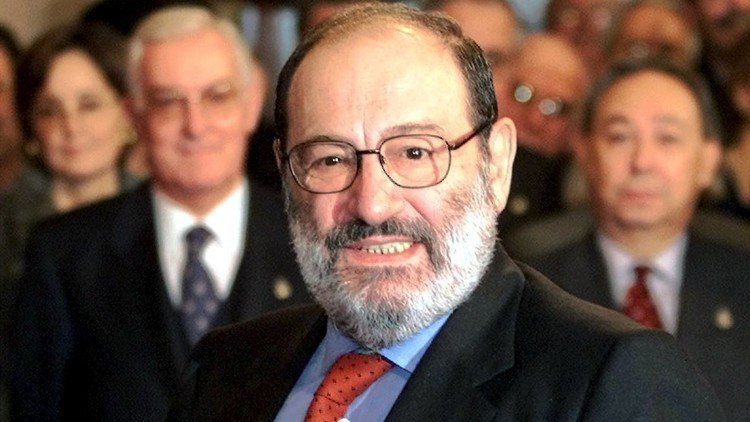Italian Prime Minister Matteo led tributes to the philosopher and semiotics lecturer who once famously described writing best-selling, heavyweight novels as "something I do at the weekends."
"He was an extraordinary example of a European intellectual," Renzi said. "He embodied both the unique intelligence of the past and a tireless capacity for anticipating the future."
Friends remembered a gentle man who enjoyed whisky and wordplay in equal measure and had a nice line in self-deprecating humour: in recent years he had taken to joking after receiving prizes: "From now on, it's the Nobel or nothing."
"He was rounded in the flesh and in the heart," said Jean-Noel Schifano who translated his books into French for over 30 years.
The Nobel never came but Eco was revered around the world, largely thanks to "The Name of the Rose", the blockbuster novel that became a hit film starring Sean Connery in the then-unlikely role of a medieval monk with the detective brilliance of Sherlock Holmes.
- Incredible energy -
Jean-Jacques Annaud, the Frenchman who directed the movie, recalled "an unforgettable personality" who combined immense erudition with an irrepressible joie de vivre.
"I remember one day hearing this wonderful flute solo, and it was Umberto playing Vivaldi. Then two minutes later we were in a little bistrot and he is stuffing down pasta and cheese. That was Umberto, just this crazy joyfulness," Annaud told AFP.
The director revealed that Eco had initially been very sceptical about the choice of former James Bond actor Connery for the lead role in the film.
"But when he saw it he came to me and said 'Sean Connery was magnificent, bravo'," Annaud said.
Flags flew at half-mast in Alessandria, the town in the northern region of Piedmont where Eco was born on January 5, 1932.
He leaves a wife, Renate Ramge Eco, a German art teacher whom he married in 1962 and with whom he had a son and a daughter.
The young Umberto had a Roman Catholic upbringing, and was educated at one of the Salesian institution's schools.
His father was keen for him to read law, but instead he took up medieval philosophy and literature at the University of Turin.
In the late 1950s, he started to develop ideas on semiotics -- the study of signs, communicated either as spoken, written, scientific or artistic language.
He was appointed professor of semiotics at Bologna University in the 1970s and was to spend 40 years teaching at the ancient academic institution.
- Medieval mystery -
His move from academia to international fame came in 1980 with the success of "The Name of the Rose", which has since been translated into 43 languages and sold more than ten million copies.
A gothic murder mystery set in an Italian medieval monastery, it combines semiotics, biblical analysis, medieval studies and literary theory.
It was adapted for the big screen by Annaud in 1986, with Connery as the detective monk William of Baskerville and Christian Slater as his young assistant, Adso of Melk.
Eco was also successful with "Foucault's Pendulum" (1988), about three employees at a minor publishing house who concoct a fictional conspiracy about a medieval Christian sect called the Knights Templar.
Other novels included "The Island of the Day Before" (1994), "Baudolino" (2000) and "The Prague Cemetery" (2010), which describes staging posts in the rise of modern anti-Semitism.
Among his dozens of essays, two in particular gained enduring popularity with their analysis of cultural standards.
They are "History of Beauty" (2004), and "On Ugliness" (2007) -- explorations on what we consider to be physically attractive or repellant, and why.
In an interview with British daily The Guardian last year, the bearded and bespectacled Eco said that his approach to writing was to seek to "change" the reader.
"I don't know what the reader expects," he said. "I think an author should write what the reader does not expect."
And he always refused to apologise for the complexity of his work. "People are tired of simple things, they want to be challenged," he said.
-------------------------------------------------------------------------------------
"He was an extraordinary example of a European intellectual," Renzi said. "He embodied both the unique intelligence of the past and a tireless capacity for anticipating the future."
Friends remembered a gentle man who enjoyed whisky and wordplay in equal measure and had a nice line in self-deprecating humour: in recent years he had taken to joking after receiving prizes: "From now on, it's the Nobel or nothing."
"He was rounded in the flesh and in the heart," said Jean-Noel Schifano who translated his books into French for over 30 years.
The Nobel never came but Eco was revered around the world, largely thanks to "The Name of the Rose", the blockbuster novel that became a hit film starring Sean Connery in the then-unlikely role of a medieval monk with the detective brilliance of Sherlock Holmes.
- Incredible energy -
Jean-Jacques Annaud, the Frenchman who directed the movie, recalled "an unforgettable personality" who combined immense erudition with an irrepressible joie de vivre.
"I remember one day hearing this wonderful flute solo, and it was Umberto playing Vivaldi. Then two minutes later we were in a little bistrot and he is stuffing down pasta and cheese. That was Umberto, just this crazy joyfulness," Annaud told AFP.
The director revealed that Eco had initially been very sceptical about the choice of former James Bond actor Connery for the lead role in the film.
"But when he saw it he came to me and said 'Sean Connery was magnificent, bravo'," Annaud said.
Flags flew at half-mast in Alessandria, the town in the northern region of Piedmont where Eco was born on January 5, 1932.
He leaves a wife, Renate Ramge Eco, a German art teacher whom he married in 1962 and with whom he had a son and a daughter.
The young Umberto had a Roman Catholic upbringing, and was educated at one of the Salesian institution's schools.
His father was keen for him to read law, but instead he took up medieval philosophy and literature at the University of Turin.
In the late 1950s, he started to develop ideas on semiotics -- the study of signs, communicated either as spoken, written, scientific or artistic language.
He was appointed professor of semiotics at Bologna University in the 1970s and was to spend 40 years teaching at the ancient academic institution.
- Medieval mystery -
His move from academia to international fame came in 1980 with the success of "The Name of the Rose", which has since been translated into 43 languages and sold more than ten million copies.
A gothic murder mystery set in an Italian medieval monastery, it combines semiotics, biblical analysis, medieval studies and literary theory.
It was adapted for the big screen by Annaud in 1986, with Connery as the detective monk William of Baskerville and Christian Slater as his young assistant, Adso of Melk.
Eco was also successful with "Foucault's Pendulum" (1988), about three employees at a minor publishing house who concoct a fictional conspiracy about a medieval Christian sect called the Knights Templar.
Other novels included "The Island of the Day Before" (1994), "Baudolino" (2000) and "The Prague Cemetery" (2010), which describes staging posts in the rise of modern anti-Semitism.
Among his dozens of essays, two in particular gained enduring popularity with their analysis of cultural standards.
They are "History of Beauty" (2004), and "On Ugliness" (2007) -- explorations on what we consider to be physically attractive or repellant, and why.
In an interview with British daily The Guardian last year, the bearded and bespectacled Eco said that his approach to writing was to seek to "change" the reader.
"I don't know what the reader expects," he said. "I think an author should write what the reader does not expect."
And he always refused to apologise for the complexity of his work. "People are tired of simple things, they want to be challenged," he said.
-------------------------------------------------------------------------------------









 Home
Home Politics
Politics











